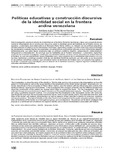Políticas educativas y construcción discursiva de la identidad social en la frontera andina venezolana

View/
Date
2013-12-19Palabras Clave
Políticas educativas, Identidad, Lenguaje, FronteraEducational policies, Identity, Lenguage, Border
Les politiques éducatives, L'identité, La langue, La frontière
Metadata
Show full item recordAbstract
Esta investigación aborda el estudio de la identidad en el territorio fronterizo tachirense y tiene como propósito fundamental la interpretación de la construcción discursiva sobre la identidad social del habitante de la frontera andina venezolana – colombiana (concretamente en el Municipio Pedro María Ureña) y su relación con las políticas educativas oficiales referidas al refuerzo de las identidades nacionales, regionales y locales. La información que soporta el trabajo fue recolectada mediante fuentes documentales y la entrevista en profundidad aplicada a cinco informantes elegidos deliberadamente. Los datos fueron analizados bajo un enfoque cualitativo (registro, categorización, sistematización, triangulación e interpretación). Se concluye que los habitantes de la frontera venezolana – colombiana, específicamente los del municipio investigado, construyen una identidad híbrida, es decir, toman elementos de ambos lados de la frontera, lo cual comprende tanto rasgos dialectales como otros aspectos de la cotidianidad relacionados con costumbres, tradiciones y prácticas sociales. Este tipo de identidad fronteriza particular, por otra parte, no es reconocida en las políticas educativas públicas, que consideran todos los territorios de frontera como un conjunto homogéneo y se limitan a proponer como estrategias para el refuerzo de la identidad nacional y regional algunas manifestaciones culturales asociadas al folklore.
Collections
Información Adicional
| Otros Títulos | Education policies and the speech construction of the social identity at the venezuelan andean border - Les politiques de l'education et la construction discursive de l'identite social dans la frontiere venezuelienne des andes |
| Correo Electrónico | leydysr@hotmail.com ffreitesb@yahoo.es |
| ISSN | 1315-401X |
| Resumen en otro Idioma | The investigation is about the study of the identity in Táchira state and its main purpose is the interpretation as how the speech is constructed as well as the social identity of the inhabitants at the Andes border between Venezuela and Colombia (specifically in the municipality of “Pedro Maria Ureña”), also the relation with the official education policies that reinforce national, regional and local identity. In the investigation the concepts of identity and the different perspectives about the construction of the speech are revised which helps to support the thesis. For the investigation, data was collected through documentaries and in depth interviews to five people deliberately selected. The data was then analyzed using a qualitative research method. It is concluded that the inhabitants in the Venezuelan border with Colombia, specifically the ones from the municipality mentioned above, build a hybrid identity, that is, they take elements from both sides of the border with dialectic characteristics as well as aspects of their daily life in relation to costumes, traditions and social practices. This type of identity on the other hand is not recognized by the public education policies, that consider all territories at the border as a homogenous group, as a consequence, the policies are limited to strategies that propose as a reinforcement of national and regional identity some cultural manifestations associated with folklore. - Cette recherche porte l’étude de l’identité dans la région frontalière de Táchira et son objectif fondamental est l’interprétation de la construction discursive de l’identité sociale des habitants de la frontière des Andes du Venezuela - Colombie (en particulier dans la municipalité Pedro María Ureña) et sa relation avec politiques éducatives officielles liées au renforcement des identités nationaux, régionaux et locaux. L’information a été recueillie par sources documentaires et des entrevues appliquées profondément à cinq informateurs choisis délibérément. Les données ont été analysées à partir d’une approche qualitative (l’enregistrement, la catégorisation, la systématisation, la triangulation et l’interprétation). On conclu que les habitants de la frontière Vénézuéla - Colombie, spécifiquement dans la municipalité nommée, ont construite une identité hybride, c’est à dire, en prenant des éléments des deux côtés de la frontière, qui comprend deux traits dialectaux et d’autres aspects de la vie quotidienne liées à les traditions et les pratiques sociales. Ce type particulier d’identité de frontière, d’ailleurs, n’est pas reconnu dans les politiques publiques d’éducation qui tiennent compte de tous les territoires frontaliers comme un groupe homogène et se limitent à proposer des stratégies pour renforcer l’identité nationale et régionale associé à des manifestations culturelles, comme le folklore. |
| Colación | 100-112 |
| Periodicidad | anual |
| Publicación Electrónica | Acción Pedagógica |
| Sección | Acción Pedagógica: Otras Investigaciones, Estudios y Reflexiones |





